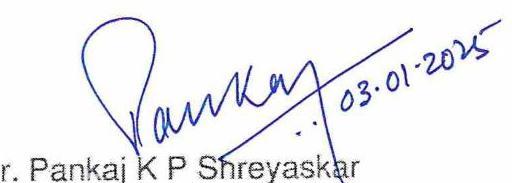The National Statistics Office (NSO) is implementing a mechanism to reconcile divergent datasets across different Central and State administrative departments. This initiative addresses the need for consistent data interpretation and adherence to statistical standards, as emphasized by the United Nations Fundamental Principles of Official Statistics. The ASPD will serve as the Nodal Division, tasked with resolving data divergences through consultation with stakeholders and guidance from the National Statistical Commission. This process aims to enhance transparency, integrity, and quality in the compilation and dissemination of statistics within the Indian National Statistical System (INSS).
SOURCE PDF LINK :
Click to access Mechanism_for_Reconciliation_Diviregent_Datasets.pdf
Click to view full document content
F-23015/61/2024-ASPD
भारत सरकार/Government of India
सांख्यिकी और कार्यक्रम कार्यान्वयन मंत्रालय/Ministry of Statistics and Programme Implementation
राशीय सांख्यिकी कार्यालय/National Statistics Office
(प्रशासनिक सांख्यिकी एवं नीति प्रभाग /Administrative Statistics and Policy Division)
$* * * * * * * * *$
खुर्शीद लाल भवन/Khurshid Lal Bhawan
जनपथ, नई दिव्यी/ Janpath, New Delhi – 110001
दिनांक/ Dated: 03.01 .2025
Office Memorandum
Subject: Mechanisms for Reconciliation of Divergent Datasets -reg
Synchronization of data/datasets collected and disseminated by the Central Ministry/Departments/Organisations, and State administrative Departments/Organisations, has been a long felt need in the National Statistics Office (NSO). In the recent few months, this Ministry has received a couple of references from NITI Aayog, among others, requesting it to reconcile the definitional divergences between important surveys, undertaken by two different Central Ministry/Departments.
2. Principle 3 of the United Nations Fundamental Principles of Official Statistics (UNFPOS), as adopted by the Government of India in 2016, provides for facilitating a correct interpretation of the data, the statistical agencies are to present information according to scientific standards on the sources, methods and procedures of the statistics. After a detailed deliberation on this matter, and in pursuance of this Ministry’s various mandates inter alia as laid down in the Allocation of Business Rules (AoBR), 1961, viz. “Laying down and maintenance of norms and standards in the field of statistics, evolving concepts, definitions and methodology of data collection, processing of data and dissemination of results”, it has been decided to institutionalise a mechanism for reconciliation of divergent datasets in the NSO.
3. Now, therefore, the Central Ministry/Departments/Organisations, and State/UT Departments/Organisations, may make references of any matters relating to data/ definitional divergences to this Division of NSO, for suggesting ways and means of harmonious resolution of these divergences, or credibly explaining the reasons for such divergences. The NSO, however, may also take suo moto cognizance of such divergences for their appropriate resolution. The aforementioned resolution of divergences shall be arrived upon in consultation with the stakeholder Ministry/Department/Organisations, including the Division(s) of NSO. These resolution may also be placed before National Statistical Commission (NSC) for their guidance, if divergence persists.
4. ASPD would act as the Nodal Division for this exercise under the overall supervision of DG (Data Governance) in NSO. The import of the OM comes to the force with immediate effect.
5. A detailed Standard Operating Procedure (SOP) for referring the matters of data divergences to NSO for their harmonious resolution is placed at Annexure I.
6. This issues with the approval of Competent Authority.

DDG (ASPD)
Standard Operating Procedure (SOP) for referring the matters of data divergences to NSO for their harmonious resolution
India is a signatory to the Special Data Dissemination Standards (SDDS) of the IMF, and as such India meets the requirement of timeliness and other relevant guidelines in this regard. In the interest of monitorable elements of the SDDS for access, integrity, and quality emphasize transparency in the compilation and dissemination of statistics.
2. The central Ministry/Departments/Organisations, and the State/UT Department/Organisations, are required to disseminate documentation on mandate of data collection, quality standards, statistical methodology, in the National metadata Structure (NMDS) prescribed by the NSO. The dissemination of the data/datasets, along with their metadata details as per NMDS, on the one hand is likely to bring consistency of various concept, definition, methodologies etc. used in the data life cycle at all levels in the longer run, it may be a provenance for attributing reasons for data divergences, on the other hand, in the Indian National Statistical System (INSS).
3. The central Ministry/Departments/Organisations, and the State/UT Department/Organisations, through their Statistical Advisors (SAs) or any other designated officers as decided by the competent authority, may refer the matter of data/ definitional divergence along with a background note and possible explications, if any to this Division.
4. On receiving such references, ASPD, NSO, will analyse the case and propose plausible resolution(s), in consultation with the stakeholders, including with the Division(s) of NSO, as also through seeking inputs from the research institutions, already engaged with the NSO, through NSO’s Reaserch Analysis Unit (RAU), for the consideration of DG (Data Governance), NSO.
5. DG (Data Governance), NSO, may convene as many meetings of the stakeholders, as may be necessary, for suggesting resolution. Any other special invitee(s) may also be invited with the competent approval, if any domain specific inputs are required for arriving on to such resolution.
6. The appropriate resolution of data divergences, may be suggested to the concerned central Ministry/Departments/Organisations, and the State/UT Department/Organisations for their consideration.
7 . The stakeholder Ministry/Departments/Organisations, and the State/UT Department/Organisations are expected to keep the NSO informed about the manner of the disposal of its recommendations regarding data divergences.